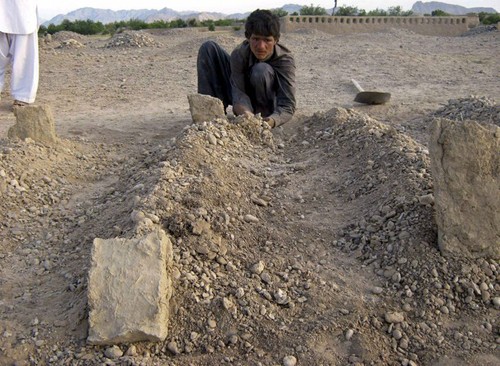NATO risks leaving Afghanistan with a legacy of impunity unless the unlawful killings of civilians by international forces over more than a decade are addressed through justice and reparations, Amnesty International said ahead of a key international summit on 4-5 September in Newport, Wales.
Among the agenda items for the NATO heads of state and government attending will be the support and training of the Afghan National Security Forces (ANSF), who will assume full responsibility for security in the country by the end of the year.
“With the end of the security transition just a few months away, it is a key time to address the almost total lack of accountability for civilian casualties, which is clearly unlawful and wholly unacceptable” said Richard Bennett, Amnesty International’s Asia Pacific Director.

An Afghan boy places dirt over the grave of one of his family members after air strikes in Ganj Abad of Bala Buluk district, in Farah province, May 5, 2009. (Photo: Reuters)
“Those responsible for killing civilians unlawfully since the international intervention began in 2001 must be brought to justice, while families and survivors must be provided with reparations in accordance with international standards. Afghan troops also need much more support for preventing, monitoring and addressing human rights violations.”
In a recent report, Amnesty International documented the almost complete lack of justice for civilian casualties caused by US and other NATO forces in Afghanistan. The report focused mainly on US forces, which have comprised the majority of international forces in Afghanistan and have been implicated in the large majority of cases involving civilian casualties.
Amnesty International estimates that some 1,800 civilians were killed in international military operations between 2009 and 2013, the period covered by the report.
While not every civilian death in armed conflict implies a breach of international law, several of the cases Amnesty International investigated showed compelling evidence of war crimes by US forces – yet prosecutions have been rare.
“The USA and its NATO partners must urgently investigate all cases where civilians appear to have been killed by international forces, and ensure that families and survivors get the justice and reparations they deserve where there is evidence of unlawful killing,” said Richard Bennett.
“NATO should also publicly release the findings of its own investigations that have already taken place, including by the Joint Incident Assessment Teams that are deployed to assess reports of civilian casualties.”
With Afghan forces set to assume full security responsibility by 2015, NATO and the Afghan government have taken welcome steps to establish a mechanism to monitor rights violations by the Afghan military.
“We have also received disturbing reports of a range of human rights violations committed by Afghan security forces, and it is welcome that both the Afghan government and NATO appear to be taking steps to address these. NATO should ensure that the ANSF establishes an effective and well-resourced mechanism to monitor and investigate civilian casualties and, when called for, prosecute personnel who commit violations,” said Richard Bennett.
Further recommendations
Conflict-related violence and insecurity continues to cause internal displacement. An estimated 631,286 Afghans remain internally displaced in the country as a result of the conflict, including tens of thousands in the last year alone. NATO must address the displacement resulting from the conflict and, as part of efforts to improve the capacity of the ANSF, training and policies on protection of civilians must include displacement prevention and mitigation.
As NATO is set to complete its security transition, it should also take steps to help strengthen the role of women in the peace and reconciliation process, and, more broadly, to encourage their participation in public affairs. This must include the full implementation of the UN Security Council Resolutions on the role of women in Afghanistan, including UNSC Resolution 1325. Efforts must be made at the Summit itself and in the follow-up process, to ensure the meaningful participation of Afghan women both from state institutions and civil society, and ensure their views are heard and taken into consideration.



